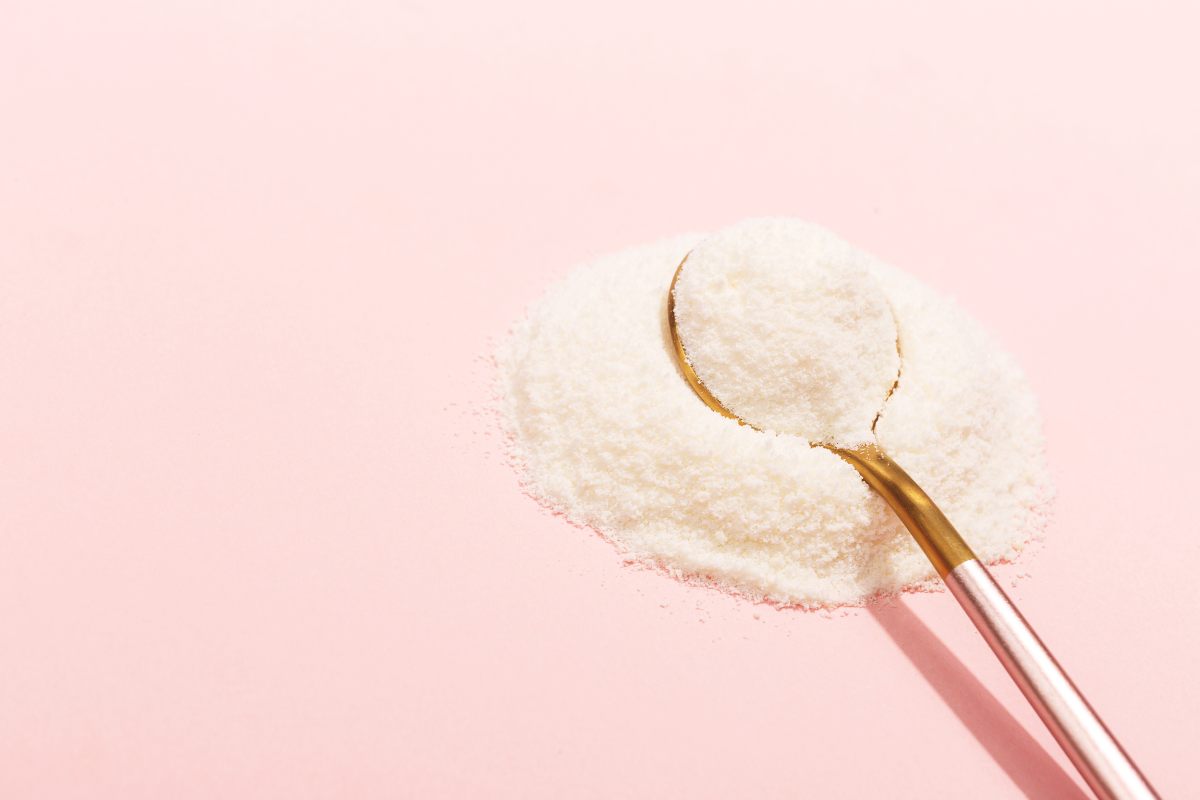Collagen, leaky gut and gluten

Collagen, leaky gut and gluten
Gluten and leaky gut
Some doctors deny that leaky gut exists, while others claim that it is at the root of many health conditions and diseases. Leaky gut is still something of a medical mystery. Scientists are still trying to figure out exactly what it is and what causes it. Some believe that gluten causes leaky gut, but its role is complicated. In this article you can read more about gluten and leaky gut.
What is gluten?
Gluten is a protein consisting of the two proteins gliadin and glutenin, which are found in wheat, barley and rye. Gliadin is the part of gluten that some people have a negative reaction to.
What is leaky gut?
The digestive system performs several very important functions in the body. In the digestive tract, your body breaks down food and absorbs nutrients into the bloodstream. In addition, the walls of the intestines act as an important barrier between the intestine and the rest of the body. The intestinal wall acts as a gatekeeper and determines which substances pass through the bloodstream and organs. The term "intestinal permeability" describes how easily substances pass through the intestinal wall. It's another word for leaky gut syndrome.
Usually there are small gaps between the cells in the small intestine. These gaps are called tight junctions. tight junctions. If they are damaged or become too loose, it causes the gut to become "leaky". This allows substances and organisms in the gut to leak into the bloodstream. When bacteria and toxins leak into the bloodstream, it causes widespread inflammation in the body.
Increased intestinal permeability has been associated with autoimmune diseases and inflammatory bowel disease, but also other health conditions:
- Inflammatory bowel disease (IBD): Crohn's disease, Ulcerative colitis and unclassified colitis ("Inflammatory bowel disease unclassified" [IBD-U])
- Celiac disease (gluten intolerance)
- Lupus (SLE)
- Multiple Sclerosis (MS)
- Diabetes type 1 and diabetes type 2
- IBS (irritable bowel syndrome)
- Allergies
- Asthma
- Acid reflux
- Anxiety and depression
- Bloating and gassy stomach
- Stomach ache
- Brain fog
- Depression
- Constipation or diarrhea
- Fatigue
- Food sensitivity
- Digestive problems
- Nutritional deficiency
- Headaches and migraines
- Joint pain and joint rheumatism (Rheumatoid Arthritis (RA)
- Skin problems (acne, rashes, skin redness, rosacea, eczema, psoriasis)
- Difficult to lose weight and overweight
- Inflammation - Inflammation is a condition that occurs when the body defends itself against something that is perceived as foreign - for example, bacteria or viruses. The body's immune system then starts a series of complex biological reactions to eliminate the invaders and heal.
Instead of treating the symptoms that occur in connection with a leaky gut, you should start by repairing the gut.
Celiac disease is an autoimmune disease that affects the small intestine
Most people can handle gluten well, but not everyone. Some people have an intolerance to gluten, i.e. gluten intolerance which is also called celiac disease. Celiac disease is an autoimmune disease.
If a person with gluten intolerance eats foods that contain gluten, they get inflammation in the lining of the small intestine. Stomach discomfort and difficulty absorbing important nutrients are typical symptoms. To avoid symptoms, she must exclude gluten completely from her diet.
However, some people test negative for celiac disease but still react to gluten. This is called non-celiac disease, and here one is simply sensitive to gluten.
The symptoms are similar to celiac disease, but without the autoimmune response. People with non-celiac disease may experience diarrhea, bloating and gas, along with joint pain and brain fog.
There is currently no clinical method for diagnosing non-celiac disease, also known as gluten sensitivity. If you react negatively to gluten and your symptoms are relieved with a gluten-free diet, you probably have gluten sensitivity.
The topic of gluten is still highly debated. Some doctors believe gluten is harmless unless you have celiac disease. Others claim that gluten is the root cause of all kinds of health conditions and autoimmune diseases and conditions.
Gluten activates zonulin, which regulates intestinal permeability
Several studies have shown that gluten can increase intestinal permeability and cause an immune response in the body. The immune system responds to substances it recognizes as harmful by causing inflammation. Inflammation is one of the body's natural self-protection mechanisms, although persistent inflammation can be associated with several chronic conditions.
In individuals with sensitivity to gluten, the protein is considered a foreign invader by the body, leading to inflammation.
How does gluten affect zonulin and intestinal permeability?
Zonulin is a protein that regulates the tight junctions in the small intestine. When zonulin is released in the intestines, the tight junctions open slightly and allow larger particles to pass through the intestinal wall. Some studies have shown that gluten activates zonulin, which leads to increased intestinal permeability.
One study showed that gluten activated zonulin in cells of both individuals who had gluten intolerance and those who did not have an intolerance to gluten. However, the levels of zonulin were much higher in cells of people with celiac disease.
How does this affect people with gluten sensitivity?
Studies have consistently shown that gluten significantly increases intestinal permeability in people with celiac disease. However, there are mixed results regarding individuals without celiac disease. A clinical study also found that gluten increased intestinal permeability in people with irritable bowel syndrome (IBS).
Individual health can play a role in developing leaky gut
Gluten activates zonulin, but it does not affect everyone in the same way. It is clear that gluten can increase intestinal permeability in those with celiac disease and possibly in those with IBS. However, it appears that gluten does not increase intestinal permeability in people without these health conditions.
What factors increase the risk of having a leaky gut?
Gluten may play a role in the development of leaky gut syndrome in people with celiac disease or IBS, but it is certainly not the only cause.
Researchers are still trying to understand exactly what causes leaky gut syndrome. However, some factors are known to contribute to the condition of leaky gut.
Some contributing factors are:
- Unhealthy diet. A diet high in fat and refined carbohydrates can increase intestinal permeability.
- Stress. Prolonged stress can alter gut-brain interactions and lead to all kinds of gastrointestinal problems, including increased gut permeability.
- Non-steroidal anti-inflammatory drugs (NSAIDs) . Overuse of NSAIDs, such as ibuprofen, can increase intestinal permeability.
- Inflammation. Chronic widespread inflammation contributes to several chronic conditions, as does increased intestinal permeability.
- Poor intestinal flora. When the balance between the good and the bad bacteria lining the gut is compromised, it can contribute to leaky gut syndrome.
- Zinc deficiency. Lack of zinc in the diet can alter intestinal permeability and contribute to several gastrointestinal problems. A dietary supplement with zinc or a diet rich in zinc can improve the stomach and intestinal wall.
Should everyone avoid gluten?
Gluten causes significant health problems for some people. For people with celiac disease, gluten increases intestinal permeability and triggers an autoimmune response and inflammation. However, the relationship between gluten and intestinal permeability is complex and not yet fully understood.
If you have symptoms of gluten sensitivity, it may be beneficial to remove gluten from your diet.
What to eat to counteract a leaky gut?
One of the keys to improving your gut health and preventing leaky gut syndrome is to improve your gut flora. This means increasing the good bacteria in the gut. Here are some ways to improve your gut health:
- Eat probiotics. Probiotics are good bacteria that can improve gut health. Probiotics are found in foods such as yogurt, kefir, sauerkraut, and kimchi.
- Eat prebiotics. Prebiotics are food for intestinal bacteria (probiotics). Prebiotics are fibers and are found in fruits, vegetables and legumes that contain a lot of soluble fibers, which feed the good bacteria in the gut. You can also take a dietary supplement with collagen and prebiotics to heal a leaky gut,
- Avoid refined carbohydrates. Avoid drinks with sugar and foods with added sugar or refined wheat flour. The harmful bacteria in the gut love these foods.






